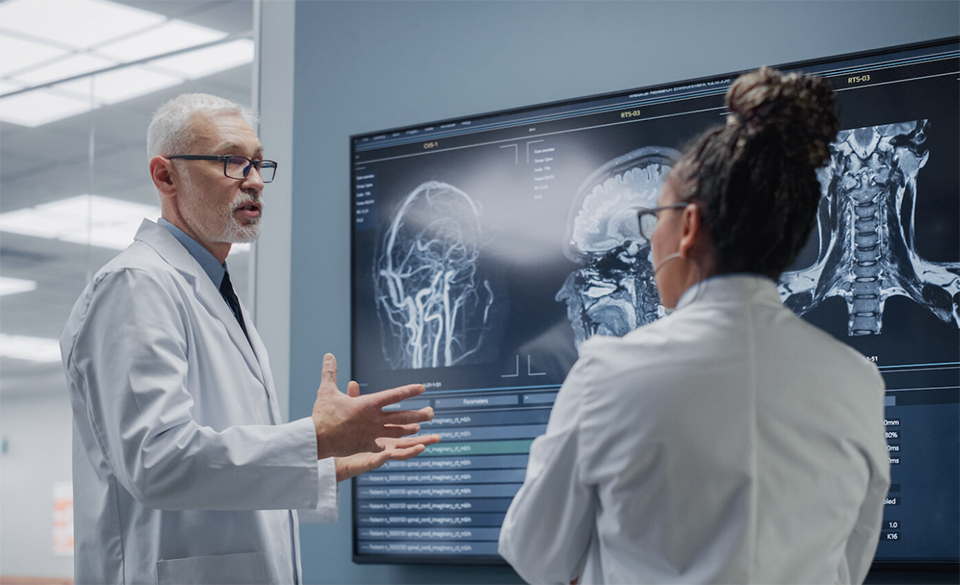Post-Traumatic Stress Disorder – PTSD
Trauma, Stress, Tragedy – You Don’t Have To Keep Reliving It
A non-invasive, drug-free treatment for PTSD is now available. It’s called MeRT, which stands for Magnetic e-Resonance Therapy.

PTSD – DEFINED
 Possible PTSD Symptoms
Possible PTSD Symptoms
PTSD can occur when a person has difficulty recovering after experiencing or witnessing a terrifying event, abuse, or extreme or prolonged stress. The condition can last months or years, with triggers that can bring back memories of the trauma accompanied by intense emotional and physical reactions. If you have Post-Traumatic Stress Disorder (PTSD) or you live with someone who suffers from this condition, then you know that it can seriously affect one’s quality of life.
These are some possible symptoms one may experience with PTSD:
- Reliving aspects of what happened, including vivid flashbacks, intrusive thoughts or images, and nightmares.
- Distress at reminders of the trauma.
- Being easily upset, angered, irritable, or exhibiting aggressive behavior.
- Disturbed sleep or a lack of sleep.
- Depression, anxiety, feelings of anger, fear, guilt, or apathy.
- Panic attacks.
- Difficulty concentrating.
- Feeling jumpy or easily startled.
- Emotional numbness or being cut off from your feelings.
- Doing things that could be self-destructive or reckless.
PTSD
There is Hope
Post-traumatic Stress Disorder, or PTSD, can be extremely isolating, with serious symptoms that may seem invisible to everyone else. Anxiety and Depression are conditions that often accompany PTSD.
The providers at The Brain Treatment Center in San Diego know what you are going through. To help you, we offer MeRT®, or Magnetic e-Resonance Therapy.
MeRT is an emerging technology that aims to improve brain function and communication. The TMS equipment used is FDA-cleared to treat Major Depressive Disorder and OCD and is used off-label to treat a wide variety of conditions, including PTSD.
Not only is MeRT effective on its own, but it can also be used with other therapies. Many of our patients have reported that MeRT can improve the success of accompanying therapies.
You can be at peace and enjoy your life again! Post-traumatic Stress Disorder doesn’t have to continue to haunt you! We encourage you to explore the possibilities of MeRT Treatment. If right for you, it can have a lasting impact with a greatly improved quality of life.
Call Our New Patient Coordinator to Learn More
(619) 255-2101
Or fill in the form below and she will contact you.
An Entirely New Approach
MeRT for the Treatment of PTSD
Simply stated, we use magnetic fields to stimulate and balance brain function, guided by sophisticated imaging and diagnostics.
In essence, patients with PTSD have markers we can clearly see in EEG studies. In many cases, PTSD will manifest as the result of a disruption in the front of the brain: It is common to see two competing alpha frequencies in the frontal lobe and slow rolling waveforms (delta & theta waves) drowning out what should be a single strong alpha frequency.
We work to identify these disruptions and strengthen healthy brainwave activity. As a result, we can reduce the symptoms of PTSD for the patient.
PTSD
Army Delta Force operator & how MeRT changed his life
“It was absolutely terrifying to not know what was wrong with me or how to fix the problem. BTC not only identified the deteriorated state of my brainwave activity, they restored its function… I consider the healing I experienced at BTC to be nothing short of a miracle.”
– Retired Army Delta Force operator, Scott Spooner
 Non-invasive and Drug-Free
Non-invasive and Drug-Free
What is MeRT?
MeRT, or Magnetic e-Resonance Therapy, is an emerging technology to improve brain function and communication. MeRT is a tailored, highly individualized form of TMS or Transcranial Magnetic Stimulation because it is qEEG-guided. In simpler terms, we use magnetic waves to stimulate specifically targeted areas of the brain that have been found to not be communicating or functioning optimally.
This is determined through sophisticated diagnostic tools and imaging, which are used to plan a tailored treatment approach just for you.
How Do I Know…
Is MeRT the Right Treatment?
We understand that MeRT is a relatively new treatment, and you may not be sure if this is right for your situation. Yet this is not a decision you have to make right away or all alone.
Your first step is a simple phone consultation with our New Patient Coordinator. In this free, no-obligation consultation, you can discuss symptoms and history, ask all the questions you want, and have her explain the protocols and fees. She can also further explain the treatment itself.
After the call, if you are interested in taking the next step, we can set up an appointment for a qEEG (a simple, painless, and non-invasive brain scan).
EEG/EKG Testing
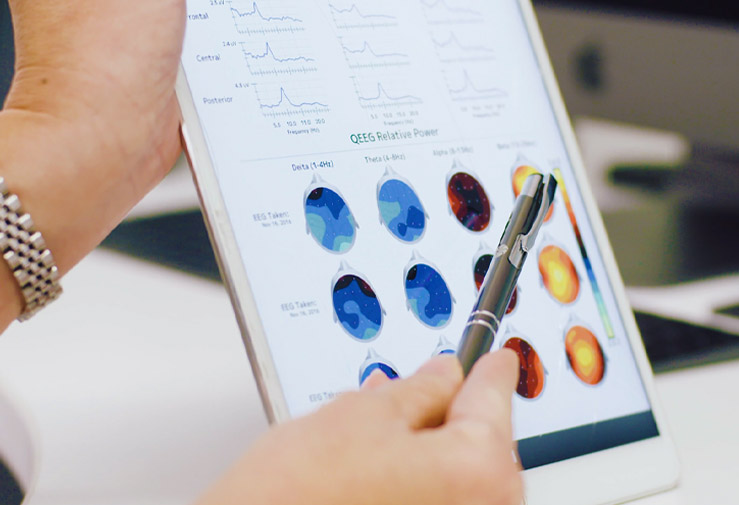
The qEEG/EKG testing is performed by our chief neurotechnician and takes approximately 45 minutes. However, if you are seeking treatment for your child with autism, please plan on spending an hour with us.
We will also gather your new patient paperwork at this time and get you scheduled for your initial assessment period of treatment.
Clinical Evaluation and Consultation
Your second appointment will be a clinical evaluation with Nurse Practitioner Kayleigh Prowse, which takes approximately 45 minutes. You can have this appointment via Telemedicine or in-clinic, whichever you prefer. Please note that if you choose a Telemedicine appointment and are seeking treatment for your child, your child will need to be present.
During this consultation, Kayleigh will answer all your questions and discuss your applicable treatment plan. You will also have an opportunity to meet with our physician and Medical Director, Julie Kim, M.D.
Assessment Period
Six weeks of treatment are recommended for patients undergoing MeRT to achieve optimal and long-lasting results. However, prior to committing to the six weeks, we have each patient go through an assessment period of treatment to see how they will respond. This assessment period is included in the six weeks of treatment.
The assessment is two weeks long. It consists of nine treatment sessions, followed by a repeat qEEG. Treatment would be provided the first week, Monday through Friday, and the following week, Monday through Thursday. A typical treatment session lasts about 30-45 minutes. Additionally, the follow-up qEEG results will be covered with you by your provider.
If clinical changes are occurring as they should and the qEEG also shows progress, you would then continue treatment, which would occur five days per week, Monday through Friday. Generally, you will begin to feel the benefits of treatment within a week or two, but because treatment is cumulative, you should continue to note improvements throughout the course of your treatment and even for some weeks after treatment. Because treatment is consecutive, you must be able to stay in or around the area while undergoing your therapy.
For those not ready to commit to an assessment period, or if we need to see the results of the testing to confirm that MeRT can help, we also offer the option of coming in for a qEEG/EKG and then having a consultation with Kayleigh or Dr. Kim to go over the results. After your clinical consultation, you will still have the option of going through an assessment period should you choose to do so.
Continuing Treatment
If clinical changes are occurring as they should and the qEEG also shows progress, you will then continue treatment. This ongoing treatment occurs five days per week, Monday through Friday. You should start to feel the benefits of treatment within a week or two, but because treatment is cumulative, you should continue to note improvements throughout the course of your treatment and even for some weeks afterward. Because we perform treatment on consecutive days, you must be able to stay in or around the San Diego area while undergoing your therapy.
Because each person’s brain and condition are unique, we customize treatment protocols specifically for each patient, guided by the qEEG results. Repeat qEEGs and clinical consultations occur every two weeks throughout treatment.
As a note, the potential side effects of treatment are minimal and should begin to dissipate as you progress through treatment. The effects of treatment generally last a lifetime, though some patients prefer occasional follow-up treatment as needed.
Improvements and results of MeRT are based on strict and active observation of our treatment protocols. Results may vary based on each person and are not guaranteed.
MeRT for PTSD Treatment Featured on The Broken Brain Podcast
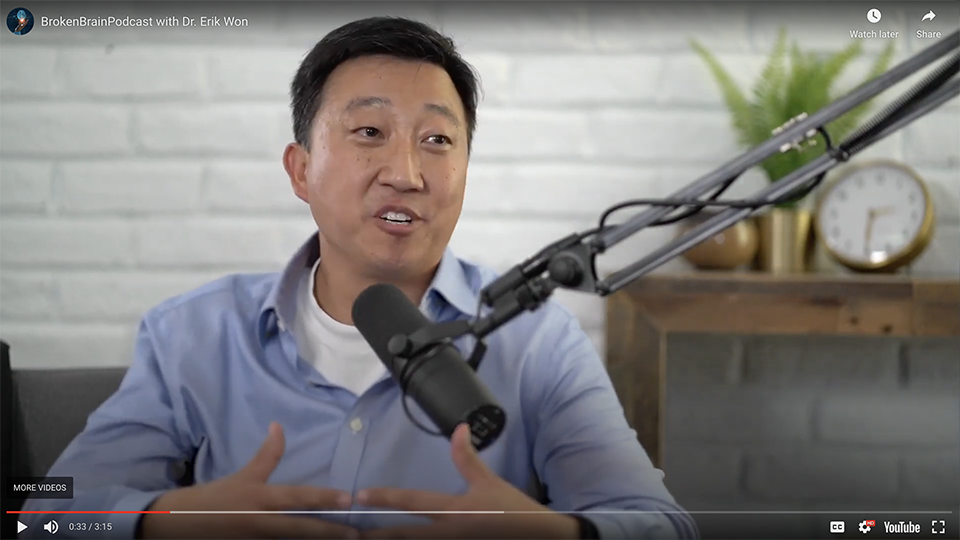
Dr. Eric Won from Wave Neuroscience (the parent company of MeRT treatment protocols) speaks about using MeRT with military members and veterans who have experienced PTSD, depression, and traumatic brain injuries from serving their country. Dr. Won also gives shares some incredible successes after treatment.
Click here to watch this informative and fascinating episode.
Research Shows MeRT’s Effectiveness in Treating PTSD Symptoms
MeRT for PTSD is based on years of independent, published research studies. Targeted rTMS (repetitive transcranial magnetic stimulation) is a key element of our MeRT treatment for PTSD. Here are some of the many studies showing the effectiveness of rTMS and MeRT in PTSD treatment:
A retrospective chart review to assess the impact of alpha-guided transcranial magnetic stimulation on symptoms of PTSD and depression in active-duty special operations service members (June 2024)
This data provides a demonstration of significant reduction in PTSD and depression symptoms and safety with the application of a-rTMS in active-duty special operations military personnel. Expansion of targeted neuromodulation programs could be impactful for military and civilian populations.”
Synchronized transcranial magnetic stimulation for posttraumatic stress disorder and comorbid major depression (Sep-Oct 2019)
All participants demonstrated significant reductions in PTSD and MDD symptoms (all p < .001). As expected, there were significant reductions in symptoms in both treatment groups, but active stimulation did provide greater reductions in count of PTSD moderate-to-severe symptoms.”
 How Electric Therapy Is Curing Navy SEALs of PTSD (Jan 2019)
How Electric Therapy Is Curing Navy SEALs of PTSD (Jan 2019)
Hundreds of vets have tried out an experimental new treatment that could change how the world addresses mental disorders.”
“All said that they saw big improvements after a course of therapy that ran five days a week for about four weeks.”
Magnetic Resonance Therapy Improve Clinical Phenotype and EEG Alpha Power in Post-traumatic Stress Disorder, in Trauma Monthly (November 2015)
This study suggests that non-invasive neuromodulation magnetic resonance therapy may lead clinical improvements as well as a trend toward normalization of EEG pathophysiology in PTSD.”
Magnetic E-Resonant Therapy Alleviates Combat Related Post-traumatic Stress Disorder, in Aerospace Medical Association (March 2017)
Our preliminary results suggest that transcranial MeRT may provide an alternate method to help veterans suffering from PTSD.”
Individualized Electromagnetic Treatment in Posttraumatic Stress Disorder: a Randomized, Double-blind, Sham-controlled Trial, Poster Accepted, Taghva, et al.
This double-blind, randomized, controlled trial shows that transcranial magnetic therapy based on individualized frequencies derived from EEG/EKG is an effective therapy for PTSD in improving overall symptoms and quality of sleep.”
EEG_EKG Guided TMS in veterans with PTSD_Randomized double-blinded pilot study
Following 2 weeks of EEG-EKG guided transmagnetic stimulation, significant changes in symptom severity and EEG measures are reported for 80 retired military veterans with post-traumatic stress disorder. Patients had greatest comparative reductions in PCL-M subscales VII ‘avoid situation indicator’ XII ‘short future indicator’ and XIII ‘trouble falling or staying asleep indicator’. The improvement in sleep was confirmed for treated vs sham group in PSQI-A, and, may suggest correlation between sleep disorder and PTSD symptoms. Of the 37 patients who had suicidal ideation by HAM-D, 29 patients denied ideation by 4 weeks. No patient worsened in clinical PTSD symptoms after receiving therapy.”
Low-frequency, Repetitive Transcranial Magnetic Stimulation for the Treatment of Patients with Posttraumatic Stress Disorder: a Double-blind, Sham-controlled Study, Nam et al. (2013)
The present study showed low-frequency rTMS to be an effective and tolerable option for the treatment of PTSD. Trials using variable indices of rTMS to the right prefrontal cortex and explorations of the differences in the effects on specific symptom clusters may be promising avenues of research regarding the use of rTMS for PTSD.”
Testimony from George Nacker, Treated for Post-Traumatic Stress Disorder at Our Newport Beach Clinic
Insurance Coverage and Payment Options

For all other insurance, we are considered out-of-network and cannot file insurance on your behalf. We can, however, provide you with the appropriate paperwork at the end of your treatment. Then you can submit it to your insurance company to see if they will reimburse you.
Currently, rTMS is FDA-approved for Depression and OCD (Obsessive Compulsive Disorder.) Treatment for all other conditions is considered “off-label.” However, for non-FDA-approved treatment, it is not likely that insurance will provide reimbursement for our protocols.
Some patients have reported that they have been able to receive some reimbursement for EEGs or clinical evaluations. However, this depends on their health coverage. Medicare patients have reported that their coverage provides no reimbursement for MeRT.
We take all major credit cards, including Visa, MasterCard, American Express, and Discover.
Care Credit
Care Credit is also an option to help finance medical expenses and is a separate company from The Brain Treatment Center San Diego. This is a credit card you can use to cover medical expenses and services. They typically offer zero-interest financing for 12 months.
When you go to the Care Credit website and apply, they will rapidly let you know if you receive approval.
Contact Our New Patient Coordinator for more Information
Interested but not sure?
Talk with our New Patient Coordinator
It’s normal for patients and their families affected by neurological conditions to feel frustrated and isolated. After all, many have lost hope that treatment can improve the condition. And we have some understanding of what you may be going through.
However, there is hope. MeRT has helped patients restore their brain function, reclaim their lives, and feel passionate about living again. That’s why we want to help guide you through the process so that you can make an informed decision about whether MeRT is the right treatment for you or your child.
It costs nothing to call us and talk about what is happening. Our New Patient Coordinator is here for you. She understands your pain and can answer all your questions. Additionally, she can explain the process and protocols, costs, possible insurance benefits, and any other details you want to know. During this no-obligation consultation, she will take all the time you need to know whether you should take the next steps.
Call Our New Patient Coordinator to Learn More
(619) 255-2101
Or fill in the form below and she will contact you.
Contact Us
For more information or to speak with our New Patient Coordinator, please fill in the information below.

 Possible PTSD Symptoms
Possible PTSD Symptoms
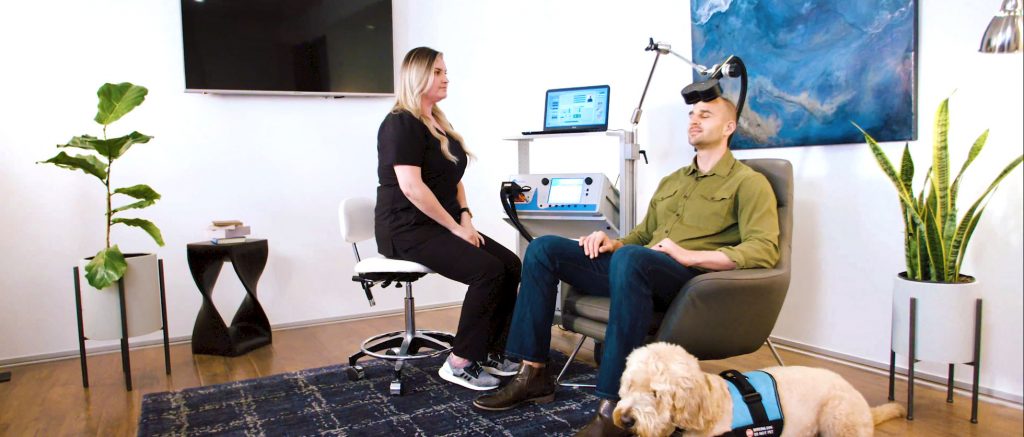

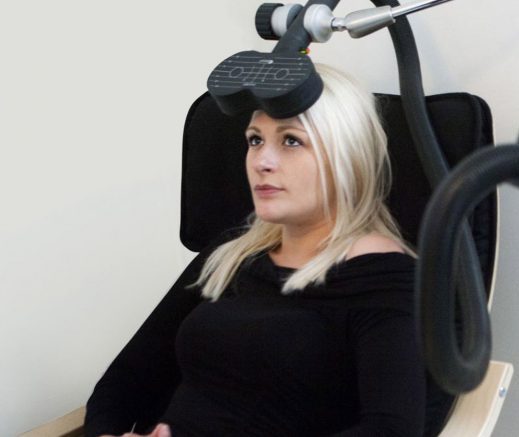 Non-invasive and Drug-Free
Non-invasive and Drug-Free